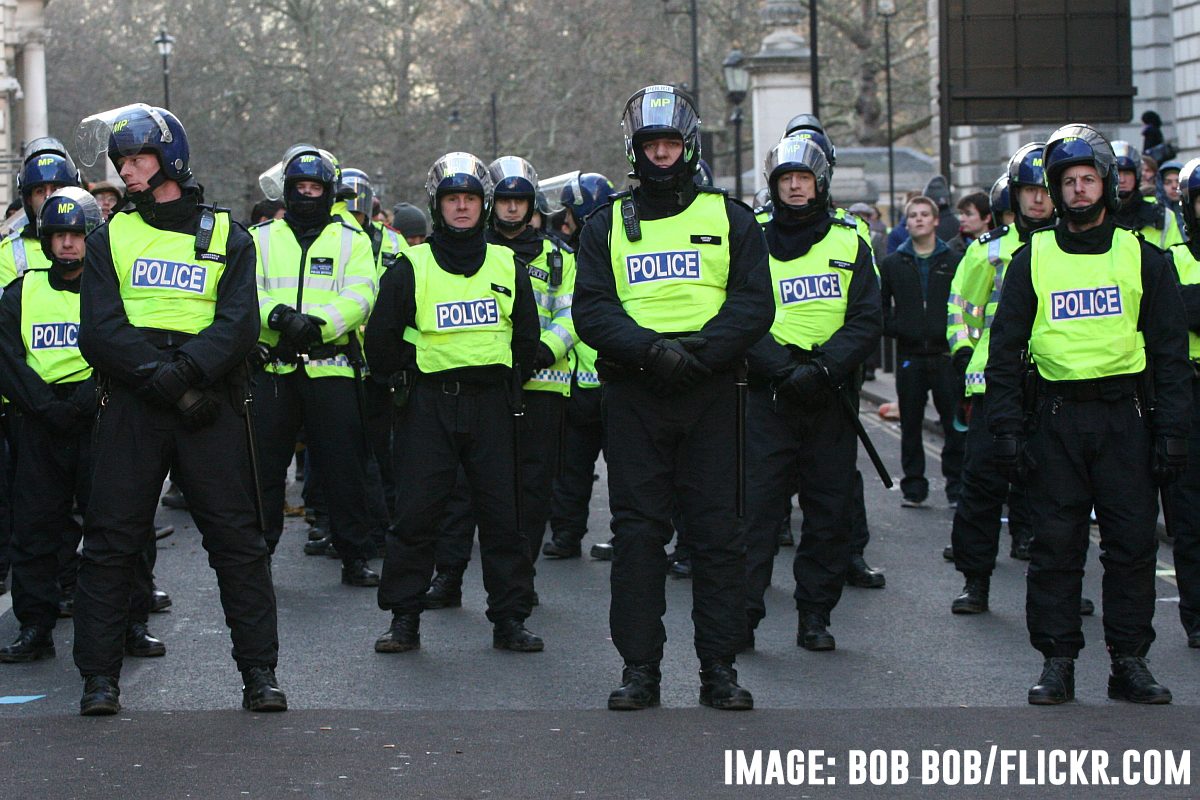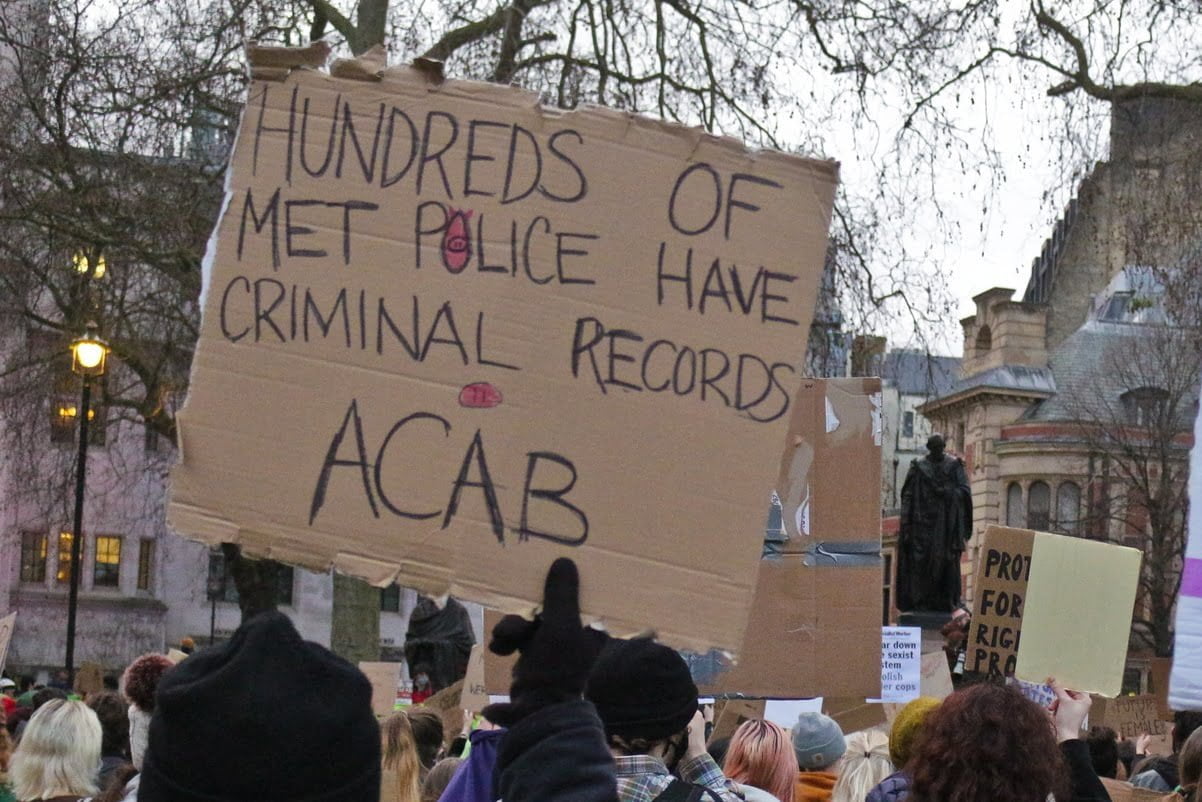From the murder of Sarah Everard, to the BLM protests: events over the past year have shone a spotlight on the role of the police under capitalism. This rotten institution cannot be reformed. It must be abolished, along with the system it protects.
“We’ve seen the WhatsApp messages #Bibaa and #Nicole.” This was the message on one of the placards at the recent #ReclaimTheseStreets protests in London.
This is a reference to the horrific story of sisters Nicole Smallman, 27, and Bibaa Henry, 46, who were stabbed to death in Fryent Country Park in north-west London last June.
When their disappearance was reported, the police seemed uninterested. “I knew instantly why they didn’t care,” stated Mina Smallman, the mother of the two women. “They didn’t care because they looked at my daughters’ address and thought they knew who they were: A pair of black women who live on a council estate.”
The bodies were not found by the police, but in fact by one of their boyfriends, who went back to the area where they had last been seen.
Rotten institution
As if this was not bad enough, there are allegations – which this placard was alluding to – that some of the police officers guarding the murder scene photographed the bodies and shared these images in a WhatsApp chat. It has also been alleged that these officers took selfies alongside the women’s bodies at the crime scene.
Commenting on this disgusting behaviour, Mina Smallman remarked: “If ever we needed an example of how toxic it [the police] has become, those police officers felt so safe, so untouchable, that they felt they could take photographs of dead black girls and send them on.”
This is an important point. Not only was the conduct of those officers appalling beyond belief. As Mina said, they “felt so safe, so untouchable”. In other words, this is not a problem of a “few bad apples”. The whole culture and institution of the Met Police is rotten.
The case of Bibaa and Nicole is very significant. Here we have a case that reveals not only the attitude of the police regarding violence against women, but also their attitude towards black people – and how these two things questions relate to each other.
It is 22 years since the Macpherson report, which looked at the police bungling of the investigation into the racist murder of Stephen Lawrence. The report concluded that, at the time, the Met Police was “institutionally racist”. Clearly those conclusions still stand.
Decades of racism
 The recent Small Axe series of films by director Steve McQueen recount the experiences of Caribbean migrants in London in the 1960s, 70s, and 80s. One of the episodes, Red, White and Blue, tells the real story of Leroy Logan – a young black man who joined the police force in 1983 after police officers assaulted his dad.
The recent Small Axe series of films by director Steve McQueen recount the experiences of Caribbean migrants in London in the 1960s, 70s, and 80s. One of the episodes, Red, White and Blue, tells the real story of Leroy Logan – a young black man who joined the police force in 1983 after police officers assaulted his dad.
Logan wanted to change the police from within. The film explores the ingrained institutional racism in the police at that time, in the 1980s. The Macpherson report was issued later, in 1999.
But Logan himself was then involved in a case of racist harassment by the Met Police – in 2003, twenty years after he had joined the force.
The police spent an estimated £100,000 on a five-month investigation against Logan, which centred around an £80 hotel bill. The intention was clear: to taint his reputation through accusations of corruption.
In the end, Logan was cleared of the charges, and was awarded £100,000 in compensation.
In 2020, Logan wrote a book about his experience in the Metropolitan Police. His conclusion was damning: “The Met police today looks and feels as racist as it was before Macpherson.”
The Met Police was racist in 1983 when Logan joined. It was declared racist by the Macpherson report in 1999. The institution was still racist in 2003, when it wrongly accused Logan of corruption. And it is still racist today.
Abuse and murder
In 2020, the most senior Asian woman on the force, Nusrit Mehtab, sued the Met Police for £500k over ‘racist and sexist abuse’. According to Sky News:
“In documents supplied to an employment tribunal, [Mehtab] alleges that she was told to keep quiet when a swastika was drawn on the wall of a police station in an area only accessible to staff. She also claims her bosses tried to hush up the graffiti.”
Add to this evidence the names of Joy Gardner, who died after being aggressively detained by police during an immigration raid in 1993; Mark Duggan, shot and killed by police in Tottenham in 2011; Edson da Costa; Rashan Charles; and Jean Charles de Menezes, murdered by police under the command of Cressida Dick, the current Met Police commissioner.
Every time I hear or read Cressida Dick’s name, I am reminded of Jean Charles de Menezes, a 27-year-old man shot dead by Met Police in 2005. De Menezes was unarmed and guilty of no crime. No-one was prosecuted for the killing; no-one even got the sack.
— Samuel Jackman (@SamuelJackman5) March 11, 2021
Furthermore, there are countless cases of racial profiling during police stop and search practices; and hundreds of other racist policing incidents that have not made it to national news.
Defending exploitation
The conclusion is inescapable. The Met Police – as an organisation – is not only racist, but also misogynist.
This is not by chance. These problems are intrinsic to the role of the police as a bulwark of the capitalist system – a system of exploitation of the majority by a small minority.
This exploitation could not survive by force alone – although it certainly does use force. Rather, the ruling class actively spreads any vile ideology that serves to divide the oppressed and exploited.
Abolish the system
The policing tactics used at Saturday’s vigil for Sarah Everard (whose alleged murderer was a serving police officer) on Clapham Common had nothing to do with concerns over COVID-19.
Rather, the brutal suppression of this protest was due to the fact that women were speaking out and voicing their anger, with many pointing the finger directly at the police.
They had plenty of reasons to do so; not least the fact that there is an ongoing internal investigation into the way in which police handled a complaint for indecent exposure against the man charged with Sarah’s murder, which was made four days before she disappeared.
In the eyes of the police, the women protesting about these injustices at Clapham Common had to be silenced.
It should therefore come as no surprise that protesters at demonstrations over the last few days have carried ‘ACAB’ signs.
But it is not simply a question of whether all police are bastards. The reality is that the police as an institution of capitalist society play a role and serve interests that demand it to be the way it is – racist and sexist to its very core.
This institution cannot be reformed. It has to be abolished. But that can only be done by abolishing the capitalist system that it defends and protects.






